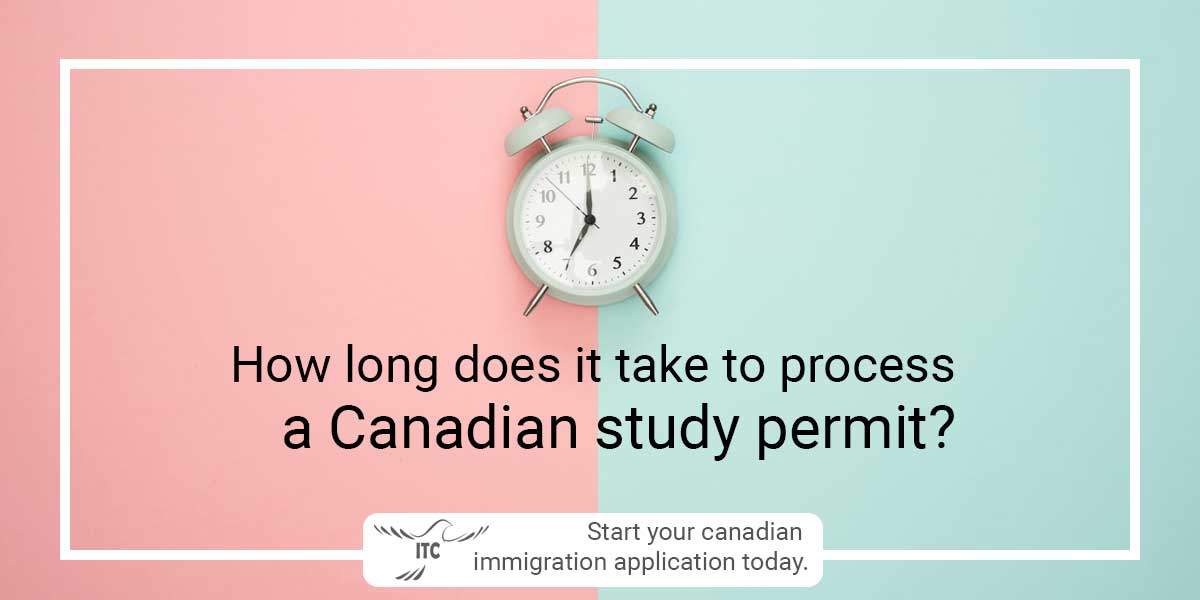How long does it take to process a Canadian study Permit?
The processing time for a Canadian study permit, or student visa, can’t be precisely determined. This duration varies throughout different times of the year and is influenced by various factors. It can range from a few days to several months, depending on the most recent data from Immigration, Refugees, and Citizenship Canada (IRCC).
One of the significant factors influencing the processing time for a Canadian study visa is the location from which the main applicant submits their request. Currently, individuals applying for a study visa from within Canada can expect a processing time of approximately 4 weeks.
Typically, a substantial number of applications come from individuals eager to initiate their Canadian journey, especially those aspiring to study in Canada.
The processing delays for these applicants are subject to various factors. Specifically, the timelines for scrutinizing applications at the Immigration Department of Canada and respective embassies contribute significantly to these delays.
Operational priorities of the department, embassy congestion based on the citizenship status of the primary applicant or the origin country, and additional factors like the accumulation of files collectively influence the temporal nuances in application reviews.
On average, the intricate process of evaluating applications for a Canadian study visa, facilitating individuals to study in Canada, spans between 8 to 12 weeks. Currently, as per the information available on the Immigration Canada website, the stipulated time for the issuance of a Canadian study visa stands at 11 weeks.
When is the ideal time for students to apply for a Canadian student visa?
Applying for a Canadian student visa is recommended by experts about three months before securing admission to the university. Canadian universities admit freshmen on a semester basis, so students can align their visa applications with the following academic terms:
- Fall Intake: Starting in September.
- Winter Intake: Commencing in January.
- Spring Intake: Starting in May.
What Factors Influence Canadian Study Permit Processing Time?
The visa process will initiate upon the receipt of your application by the embassy. Here are factors that may impact the processing time for a student visa:
- The nature of the visa application.
- Accuracy and completeness of information in the application.
- Availability of necessary supporting documents.
- Backlog within the immigration department.
- Promptness in responding to requests or inquiries from the authority.
- Applicants with a history of criminal records should anticipate delays.
- Travel bans or restrictions during emergencies.
- Changes in political leadership can also influence visa processing times.
What Factors Could Prolong the Processing Time for a Canadian Student Visa?
Several factors can contribute to the extended processing time for a Canadian student visa, primarily stemming from the following:
1- Failure to Pay Fees
If an applicant is unable to make the required payment, it indicates financial instability for the student in Canada. Additionally, students may jeopardize their chances of obtaining a study permit if they mistakenly make payments to a bank not designated for them. To prevent this, students must diligently follow all instructions related to the payment of school fees and other required payments.
2- Incorrect Documentation
Submitting documents incorrectly can pose a significant obstacle to obtaining a visa on time. To assess your eligibility, the case officer must thoroughly examine all the paperwork and related documents you’ve submitted. Any errors or mistakes noted during this review can impact visa approval.
It is crucial to avoid submitting blurry documents or photos, omitting signatures, and neglecting to fill out necessary forms. In such instances, immigration officers may suspect intentional manipulation of the process or the provision of inaccurate information.
3- Document and Data Verification
The processing of a student study permit may be delayed if the visa officer is required to reach out to another pertinent department for the verification of specific details, particularly those related to the documents or financial information you’ve provided. Addressing concerns related to the visa process involves an extensive verification process, often requiring communication with the foreign office responsible for issuing the identity used in your application.
Unforeseen Inadmissibility
Another factor contributing to an unsuccessful visa process is the Canadian rules of inadmissibility. Immigration officers, enforcing the rule of inadmissibility, can reject the entry of international students into Canada based on prior behaviors such as a criminal record, health challenges, or financial issues.
Applicants with a history of criminal activity may encounter significant obstacles in entering Canada. The mentioned factors become grounds for rejection as Canada prioritizes the safety of its citizens and residents, leading to delays in the visa processing.
What are the minimum required documents for a Canadian study permit?
When contemplating studying in Canada, the first and crucial step is acquiring a study visa. This process demands that applicants possess, at the very least, the following documents to complete their application file. Failure to furnish these documents might result in significant delays in the visa processing timeline.
In the worst-case scenario, inconsistencies arising from inaccurate information and missing documentation may become apparent to the immigration officer. This could potentially lead to an extended restriction on your Canadian visa application.
Minimum Required Documents:
- Valid international passport
- Academic certificates
- Valid and up-to-date bank documents to demonstrate financial capability
- Medical examination records
- Language proficiency certificate
Do you want to have detailed updated information about your visa file?
If your initial application is rejected, don’t be disheartened. You can learn from the reasons provided in your refusal letter and obtain more details with a Request for GCMS Notes make the necessary adjustments when reapplying. Keep in mind that IRCC generally does not impose an interim period between applications, allowing you to reapply as soon as you address the issues that led to your refusal
Do you want to have detailed updated information about your visa file?
You can apply for GCMS Report to recieve detailed information about your file; and/or Recieve copy of your file is in process in the IRCC
To find out if you’re eligible for immigration to Canada, simply complete our free assessment! A member of the ITC Immigration Team will review your eligibility and contact you to discuss your options!
Do you want to have detailed updated information about your visa file?
You can apply for GCMS Report to recieve detailed information about your file; and/or Recieve copy of your file is in process in the IRCC



